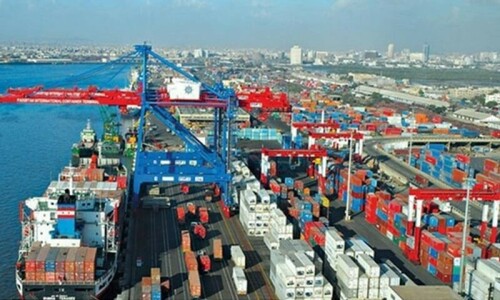DOES Pakistan have the capacity to refine the talent of its 200 million-plus people to achieve the high economic growth? The answer is found in the recently released Global Human Capital Report by the World Economic Forum that places Pakistan at 125th position.
The report, which observes the level of education and skills in 130 countries, shows that on average the world has developed the talent of only 62 per cent of its people in various fields.
The report presents its findings in the form of a Global Human Capital Index that measures the development of usefulness of skills of labour in various countries across the four dimensions: capacity for training, deployment in economy, development through education and existing technical know-how of labour.
Pakistan has an average score of 46 on the index which implies that the talent of 54pc Pakistanis has not been developed due to insufficient and irrelevant education and skills.
The lack of skilled workers is a perennial issue facing the country where the formal education system is producing graduates with little or no relevance for industry.
The curriculum and syllabus of various degree programmes lack practical depth. Students often find huge differences in the practical working of organisations as compared to what they have been theoretically taught in the universities.
Similarly, teaching in various subjects is often compromised by teachers through the adoption of easily available guide books and their assessment is conducted from the selective subjective-type questions. In the Punjab University alone, some 40,000 students pass graduation exam annually in the subjects of commerce without learning single software of accounting or finance.
The same is the case of technical and vocational institutes where the quality of teaching and assessment is miserable, resulting in poor skill building among youth. Most technical institutes lack laboratories and technical equipment required for performing experiments and practical tasks.
The low-paid teachers in vocational institutes prefer to offer private tuitions to the students. Further, the linkages of industrial and engineering firms with the vocational institutes are weak as students lack relevant skills.
However, recent initiatives undertaken by Punjab, Sindh and federal governments to improve youth’s skills through short-term courses is a step in the right direction that should be expanded and offer diversified skills.
Apart from formal technical and general educational institutes, a large number of illiterate people lack the opportunities for informal learning.
The globally practised system of internships and apprenticeship followed in industrial and commercial entities has not been developed in Pakistan where the majority of low-skills jobs are still granted on relationship or informal recommendations.
There is also a dire shortage of high-quality training institutes where illiterate people can be guided in their local languages in an informal way to learn some basic skills to earn a decent wage.
Similarly, in the digital age, opportunities need to be created to improve the skills of employees working in public and private sector bodies.
The development of new software and continuous improvements in information technologies are changing the landscape for employees to unlearn the old methodologies of job performance and learn the new systems for higher productivity and efficiencies necessary for surviving in the age of competition and globalisation.
Globally, the emerging trend for this type of education is MOOCs (Massive Open Online Courses) where online education tools are created for a particular subject to teach new skills to the interested participants worldwide often at a nominal or no fee.
Lastly, the policymakers should realise that the old-fashioned Malthusian theory, which considers higher population a burden on the economy, is no more relevant in the age of globalisation where the raw talents of any country can be refined through relevant education and training to produce skilled workers.
We need to learn a lesson from the rising economies of China, Vietnam, South Korea and India who have built their economic strength on the basis of their efficient and skilled labour resulting in attracting the huge foreign direct investment from the global manufacturing and service providing companies in their territories.
Published in Dawn, The Business and Finance Weekly, October 9th, 2017













































